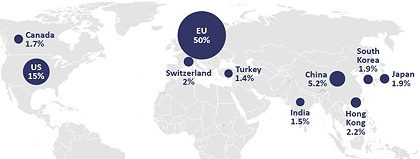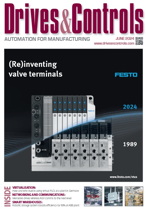Impending Brexit will ‘disrupt’ UK manufacturing sector

Brtian's departure from the European Union – Brexit – will have significant adverse effects on the UK manufacturing sector and on the wider economy, according to a new report from UK in a Changing Europe, an initiative set up to provide impartial information on UK-EU relations. The report, Manufacturing and Brexit, finds that Brexit will have “disruptive and negative” effects on the UK manufacturing sector, with the extent of disruption depending on the outcome of the UK-EU negotiations.
A worst-case scenario of no trade deal being reached between the EU and the UK would introduce delays at the UK-EU border, add costs and disrupt tightly interwoven supply chains, the report predicts. Some sectors, such as volume automotive production, will particular badly affected just as they are trying to recover from the slump caused by Covid-19. According to Mike Hawes, chief executive of the Society of Motor Manufacturers and Traders (SMMT), a 10% tariff would add about £1,500 to the cost of a vehicle – equivalent to two to three times the margin that most car plants operate to. It will “undermine the competitiveness of the industry,” he says.
The report says that few UK manufacturers have found any benefits from Brexit which, even if a deal is agreed, will cause significant disruption. Nearly all sectors of industry are concerned about a potential lack of regulatory alignment with the EU and most want to see continued free trade, it adds. Uncertainty about the future UK–EU relationship is making it difficult to prepare for the post-Brexit business environment – a point taken up by de facto Brexit minister Michael Gove, who recently expressed concern at how few businesses have made Brexit preparations. He said that figures show that almost two-thirds of businesses have made no preparations for the end of the Brexit transition period.
UK manufacturers are especially worried about the UK falling out of common EU regulations, and want UK and EU technical, safety, and other regulations to remain aligned. If this does not happen, manufacturers will have to make products to different specifications for the UK and EU markets. They also want an agreement that means they do not have to carry out safety and other tests twice.
According to the report, potential additional costs for UK manufacturers arising from Brexit include: tariffs; customs declarations (with an estimated annual cost of £15bn); certification; audits; loss of R&D collaboration; border delays; EU customers switching to other suppliers; and visa costs for EU workers.
These would all add to the costs of doing business, with no discernible benefit, says the report, with some sectors being particularly exposed. Nearly half of all of the UK’s imports and exports are with the EU. Many UK manufactures have grown to depend on frictionless trade with the Union to maintain efficient supply chains. EU manufacturing workers often plug key skills gaps, such as in engineering, in the UK.
UK in a Changing Europe argues that the importance of manufacturing for the UK economy far outstrips its relatively small size (10% of the UK economy and 9% of total employment). Manufacturing, it points out, accounts for 45% of UK exports and 65% of private sector R&D spending. Some services only exist because they are closely tied to manufacturing. And in some areas, such as the West Midlands, manufacturing accounts for about a third of the wider economy.

With just six months until the Brexit transition period ends, it is still unclear what will happen, the report warns. This uncertainty, combined with Covid-19, is making it difficult for businesses to prepare for the post-Brexit business environment.
The uncertainties include not knowing: how data protection will work; whether and how manufacturers will be able to employ EU staff for short periods of time; and how state support for manufacturers will operate. These uncertainties have already contributed to falling investment in sectors such as automotive and have been cited as a factor in Nissan pulling production of its XTrail model from Sunderland.
The report recommends several actions that the UK government could take to mitigate the negative effects of Brexit on the manufacturing sector. These include:
• investing much more in an industrial policy, bringing the UK in line with other advanced economies;
• targeting specific sectors or regions;
• helping companies to take advantage of new technologies that are part of the fourth industrial revolution;
• introducing new policies on skills, R&D, financial support, wage subsides, tax deferrals, and taking equity stakes in companies; and
• transferring more power to UK’s regions and devolved institutions to develop more place-based industrial policies.
“Deal or no deal, Brexit will impact on the UK and its economy,” says Professor Anand Menon, director of UK in a Changing Europe. “It is important to understand just what form that impact might take. As this report shows all too clearly, for manufacturing it is likely to be negative and significant.”
The report’s co-author, Professor David Bailey, Professor of Business Economics at the Birmingham Business School, adds: “Manufacturing matters. It matters in terms of high-quality jobs, exports, research and development and much more. Much of the sector has already taken a hit through the Covid-19 pandemic and Brexit risks further disruption for manufacturers which they are keen to minimise.
“A no trade-deal scenario is seen as the worst-case scenario for sectors like automotive given the impact of tariffs,” he continues. “But even a minimal Free Trade Agreement could bring disruption for manufacturers – for example via its impact on supply chains and in terms of regulatory divergence.
“Whatever the form of Brexit at the end of the transition period, manufacturing faces multiple challenges in terms of recovering from the impact of Covid-19, transforming towards carbon net-zero, and embracing Industry 4.0. A more place-based and devolved industrial policy could be one way of helping manufacturing meet such challenges.”
The report notes that Germany has just announced a €130bn post-pandemic recovery plan, which will also aim to address some long-term challenges – €50bn will go towards addressing climate change, including the development of green and digital technologies. The country has also doubled its subsidy for buying electric cars to €6,000. An EU post-pandemic recovery plan, worth €750bn is also being considered, and may also contain support for green and digital technologies.
If the UK does not enact equally ambitious plans, then on top of the “double whammy” of Brexit and the coronavirus lockdown, UK manufacturing will also face a further increase in the gap between the support that it and its foreign competitors receive.





